FC/PCコリメーターパッケージ、焦点固定型
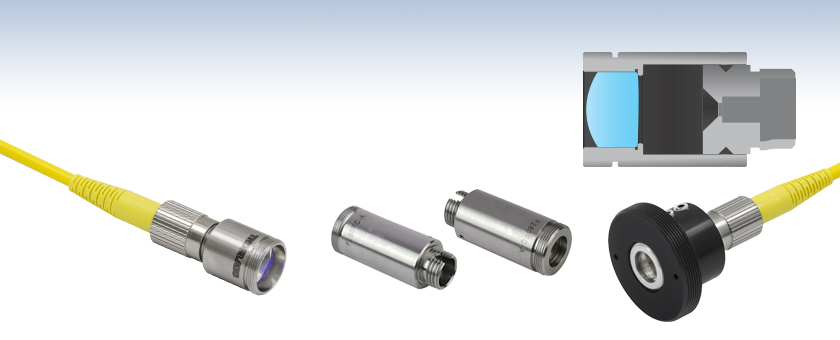
- Mates with FC/PC Connectors
- Simplifies Collimation of Output from Single Mode Fiber
- Collimated Beam Diameters Ranging from 0.63 mm to 4.0 mm
- Models Aligned at 13 Key Wavelengths from 405 nm to 4.55 µm
F240FC-B
633 nm, Focal Length: 7.93 mm
Shown with Patch Cable
F280FC-A
543 nm, Focal Length: 18.07 mm
Back
Front
Ø11 mm Collimator
Shown with AD11F
SM1-Threaded
Mounting Adapter
Fixed Focus Collimators Contain
One Factory-Aligned Aspheric Lens

Please Wait
特長
- FC/PCコネクタ付き(2.2 mmワイドキー)シングルモードパッチケーブル用ファイバーコリメータ
- 405 nm~4.55 µmでアライメント(右表参照)
- コリメートビーム径:波長により0.63 mm~4.0 mm
- コリメーターパッケージは工場でアライメント済み
- ファイバ入射型検出システムの簡略化
- 非磁性のステンレス製筐体
- ナローキーおよびワイドキーのFC/PCコネクタに対応
- カスタムアライメント波長などの特注も承っております。詳細は当社までご相談ください。
ファイバーコリメーターパッケージは、FC/PCコネクタ付きファイバからの光を回折限界性能でコリメートするように設計されています。これらのファイバーコリメータには可動部品がないため、小型で、ミスアライメントも起きにくくなっています。非球面レンズの有効焦点距離(EFL)は、色収差によって波長に依存するので、これらのコリメータは設計波長でのみ適切な性能を発揮します(詳細は「広がり角のグラフ」ならびに「計算」のタブをご参照ください)。コリメーターパッケージは、異なる波長とコリメートビーム径でご用意しております。詳細は右表の波長のリンクをクリックしてご覧ください。
非球面レンズは、特定のシングルモードファイバーパッチケーブルに接続したときに、設計波長でコリメートするように工場でアライメントされます。また、非球面レンズの両面には表面反射を最小にするようARコーティングが施されています(「ARコーティングのプロット図」タブをご参照ください)。用途によっては、ARコーティング範囲内の他の波長でも使用できる場合があります。お使いの用途に適しているかどうかについては各コリメータの広がり角グラフ(理論値)をご参照の上、ご確認ください。動作温度範囲は、-40 °C~93 °Cです。また、真空には対応しておりませんのでご注意ください。異なるアライメント波長や動作温度、真空用途への対応なども特注にて承ります。詳細は当社にご相談ください。
こちらのファイバーコリメータは、シングルモードファイバーパッチケーブル用です。性能を十分に発揮させるには、ARコーティング付きシングルモードパッチケーブルと組み合わせてご使用になることをお勧めいたします。これらのケーブルには、透過率向上とファイバ端面における反射損失低減のために、ファイバの片端に反射防止コーティングが施されています。 なお、性能仕様はシングルモードファイバをご使用時のみ保証されます。
このファイバーコリメーターパッケージの取り付けには、あおり調整(ピッチ&ヨー)機能付きのコリメータ用アダプタのご使用をお勧めします。Ø12.7 mm(Ø1/2インチ)やØ25.4 mm(Ø1インチ)ネジ無しバージョンのほか、SM05、RMS、SM1外ネジ付きもご用意しています。 M12 x 0.5外ネジ付きコリメーターパッケージは、当社のケージプレートCP1M12/Mに直接取り付けることが可能なので、30 mmケージシステムに組み込むことができます。
中赤外域用コリメータ
アライメント波長が3.45 µmおよび4.55 µmのコリメータには、当社のフッ化物ファイバーパッチケーブルのご使用をお勧めいたします。これらのコリメータには挿入する際にフッ化物ファイバの先端を保護し、ポインティングの安定性を向上させるために公差の小さいセラミックスリーブが付いています。コリメータは工場で設計波長にアライメントされていますが、その広がり角は広い波長範囲においてそれほど大きくはありません。したがって、ARコーティング範囲内の他の波長でも使用することができる場合があります。各コリメータの広がり角グラフ(理論値)をご覧いただき、用途に適しているかどうかをご確認ください。
その他
当社では、調整機能付きコリメーターパッケージのFiberPortシリーズも取り揃えております。こちらは広い波長範囲に対応する、調整機能付きの小型のファイバーカプラです。コリメートならびにカップリング用のその他のオプションついては「コリメーターガイド」タブをご覧いただくか当社までご相談ください。
| Coating Information | |||||||
|---|---|---|---|---|---|---|---|
| Coating Designation | 405 | A | B | 1064 | C | D | E |
| Coating Range | 395 - 415 nm | 350 - 700 nm | 650 - 1050 nm | 1050 - 1075 nm | 1050 - 1620 nm or 1050 - 1700 nm | 1.8 - 3.0 µm | 3 - 5 µm |
| Reflectance | <0.25% @ 405 nm | Ravg <0.5% within Coating Range | Ravg<0.5% within Coating Range | <0.25% @ 1064 nm | Ravg < 0.5% within Coating Range | Ravg < 1.0% within Coating Range | Ravg <1.0% within Coating Range |
| θ | Divergence Angle |
| D | Mode-Field Diameter (MFD) |
| f | Focal Length of Collimator |
広がり角(°)  ,
,
Dとfには同じ単位を用います。
広がり角の比較
ファイバからの光がガウス型の強度プロファイルを有する場合、ビームの広がり角は右の計算式で概算することができます。この計算式はシングルモードファイバの場合には良く当てはまりますが、強度プロファイルが非ガウス型になるマルチモードファイバからの出射光に対しては、実際よりも小さい広がり角が計算されます。
下のグラフは、当社の標準のコリメータを設計波長以外の波長で使用したときの広がり角(理論値)を示しています。例えば、ファイバからの700 nmの出射光を直径約1.5 mmのビームにコリメートする必要がある場合、コリメータF240FC-780(F240グラフ内の「-780」の線)を使用することは可能ですが、設計波長である780 nmの波長で使用する場合よりも広がり角は大きくなります。下の各コリメータの説明においても、理論計算による広がり角のグラフとその生データをご提供しています。また、標準ラインナップとは異なる波長用にアライメントされたコリメータをご希望の場合は当社までお問い合わせください。
広がり角の理論近似
下のグラフは、各コリメータの設計波長におけるビーム径の伝搬距離に対する依存性をシミュレーションした結果です。設計ファイバからガウス型強度プロファイルを有する光を入射することを仮定しています。各グラフの下部に設計波長と使用ファイバを記載しています。
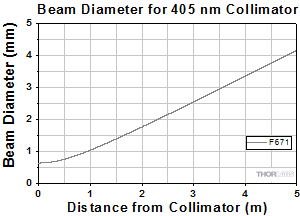
Click to Enlarge
波長405 nm、ファイバS405-XP
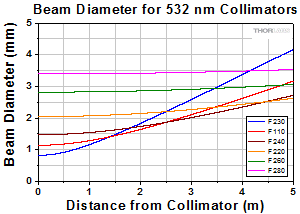
Click to Enlarge
波長532 nm、ファイバ460HP
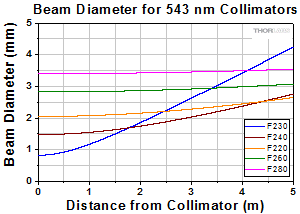
Click to Enlarge
波長543 nm、ファイバ460HP
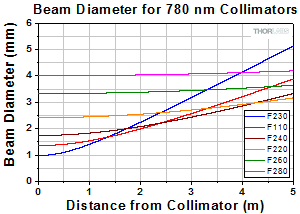
Click to Enlarge
波長780 nm、ファイバ780HP
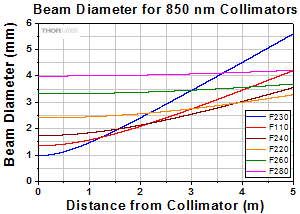
Click to Enlarge
波長850 nm、ファイバ780HP
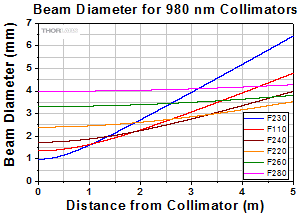
Click to Enlarge
波長980 nm、ファイバSM980-5.8-125
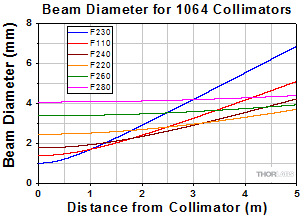
Click to Enlarge
波長1064 nm、ファイバSM980-5.8-125
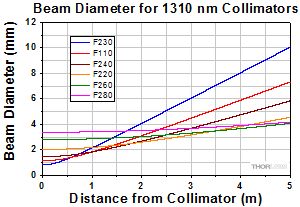
Click to Enlarge
波長1310 nm、ファイバSMF-28-J9
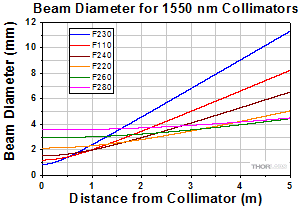
Click to Enlarge
波長1550 nm、ファイバSMF-28-J9
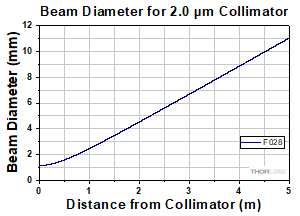
Click to Enlarge
波長2000 nm、ファイバSM2000
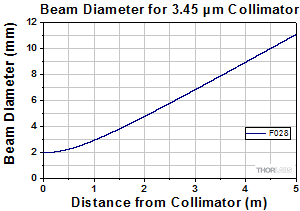
Click to Enlarge
波長3.45 µm、ファイバZrF4
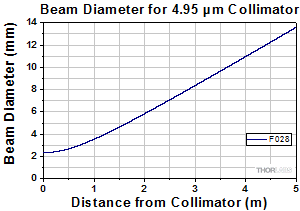
Click to Enlarge
波長4.55 µm、ファイバ InF3
広がり角の理論的近似
仕様表に記載されているビームの全広がり角(Divergence)は、ファイバーコリメータに関する理論的な計算値です。ファイバからの光がガウス型の強度プロファイルを有する場合、下記の式でその広がり角の理論的近似値を簡単に求めることができます。この計算式はシングルモードファイバの場合にはよく当てはまりますが、マルチモードファイバの場合はその出射光が非ガウス型の強度プロファイルを有するため、この式では広がり角が実際よりも小さく見積もられてしまいます。
全広がり角(°)は以下の式で求められます。

ここでMFDはモードフィールド径、fはコリメータの焦点距離です。(注:この式ではMFDとfには同じ単位を使わなければなりません)。
例:
コリメータF220FC-A(f ≈ 11.0 mm:「≈」とした理由は設計波長が543 nmのため)を使用して、ファイバ460HP(MFD = 3.5 µm)からの515 nmの光をコリメートする場合、広がり角の近似値は
θ ≈ (0.0035 mm / 11.0 mm) x (180 / pi) = 0.018°となります。
コリメータF220FC-Aとファイバ460HPを使って534 nmのビーム広がり角を測定してみると、その結果は0.018°でした。
出力ビーム径の理論的近似
出力ビーム径は以下の式で近似値が求められます。

ここでλは光の波長、MFDはモードフィールド径、fはコリメータの焦点距離です。(注:この式ではMFDとfには同じ単位を使わなければなりません)。
例:
コリメータF240FC-1550(f = 8.18 mm)とパッチケーブルP1-SMF28E-FC-1(MFD = 10.4 µm)を組み合わせて1550 nmの光を使用した場合、その出力ビーム径は
d ≈ (4)(0.00155 mm)[8.18 mm / (pi · 0.0104 mm)] = 1.55 mmとなります。
ビームウェストまでの最大距離(Maximum Waist Distance)の理論的近似
ビームウェストまでの最大距離、つまりコリメート状態を維持できるレンズからビームウェストまでの最大距離は、以下の式で近似的に得られます。

ここでfはコリメータの焦点距離、λは光の波長、そしてMFDはモードフィールド径です。(注:この式ではMFDとfには同じ単位を使わなければなりません)。
例:
コリメータF220FC-532(f = 10.9 mm)とパッチケーブルP1-460B-FC-1(MFD ≈ 4.0 µm:計算された近似値)を組み合わせて532 nmの光を使用した場合、ビームウェストまでの最大距離の近似値は
zmax ≈ 10.9 mm + [2 · (10.9 mm)2 · 0.000532 mm] / [pi · (0.004 mm)2] = 2526 mmとなります。
Insights:光学実験のベストプラクティス
こちらのページでは下記について説明しています。
- 2本のファイバ間にコリメートされた自由空間光を生成するためのファイバーコリメータのアライメント方法
- ファイバーコリメータ:アダプタを使って取り付ける場合のヒント
このほかにも実験・実習や機器に関するヒントをまとめて掲載しています。こちらからご覧ください。
2本のファイバから出力された光を自由空間を介して結合するためのファイバーコリメータのアライメント方法
光ファイバのセットアップの間に2つのコリメートレンズを挿入することによって、様々なビームへの操作が可能な自由空間光を得ることができます。1つ目のコリメータは出射側ファイバからの発散光を受光し、それによってコリメートされた自由空間ビームは2つ目のコリメータに向けてほぼ一定の径で伝搬します。2つ目のコリメータは自由空間ビームを受光し、受光側のファイバに結合します。こちらの動画においてペアで使用されているコリメーターパッケージのように、ファイバを直接ファイバーコネクタに接続するように設計されている製品がございます。
出射側のファイバからの光を100%の効率で受光側のファイバに結合できれば理想ですが、実際には常に反射、散乱、吸収、ミスアライメントなどによって損失が生じます。通常、光損失の最も大きな原因となるミスアライメントは、こちらの動画でご紹介しているアライメント法や安定化の方法により最小化することができます。
この動画では、出射側のファイバとしてシングルモードファイバを使用しています。2つ目のコリメータに入射する光パワーと、受光側のファイバから出射される光のパワーを測定しています。受光側のファイバがコア径50 µmのマルチモードファイバの場合、アライメントを行うことで、2つ目のコリメータに入射した光パワーの91%が受光側ファイバからの出射光として測定されました。受光側のファイバがシングルモードファイバの場合、この値は86%になりました。動画では、コリメータの設計の違いと、その違いがコリメート光の特性に及ぼす影響などについてもご説明しています。
そのほかにも実験室でお使いいただけるヒント、工夫や方法などの動画がこちらからご覧いただけます。また、ウェビナーでは、当社の様々な製品に関する理論や実用的な事柄などをご紹介しています。
| Products Featured During Demonstration | ||||
|---|---|---|---|---|
| Fiber-Coupled Laser | Kinematic Mounts | Fiber Adapter Cap (for Power Sensor) | Single Mode Patch Cable (FC/PC) | Fiber Cable Storage Reels |
| Triplet Fiber Optic Collimators | Power Sensor | Power Meter | Hybrid Single Mode Patch Cable | 2" Posts |
| Adapter (Mount-to-Collimator) | SM1 Thread Adapter (for Power Sensor) | Fiber Connector Cleaner | Step-Index Multimode Patch Cable | Ø1/2" Post Holders |
最終更新日:2021年4月1日
ファイバーコリメータ:アダプタを使って取り付ける場合のヒント
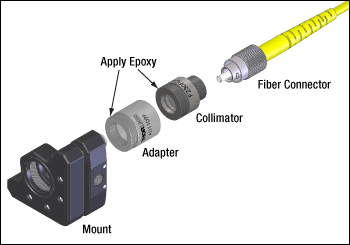
Click to Enlarge
図1:上の図では各コンポーネントをネジで結合しています。ファイバーコネクタのネジを緩めると、意図せずほかの部品同士の接続まで緩めてしまう場合があるため、当社ではほかの2箇所の接続部を接着剤で固定することをお勧めしています。
ファイバーコリメータは、ファイバ出力型光源から光学系に光を入射するときによく使用されます。当社では様々な種類のファイバーコリメーターパッケージをご用意しております。その一部のパッケージはネジの無い滑らかなバレル(トリプレットコリメータなど)になっていますが、ほかにはバレルの先端にミリ規格のネジ(非球面コリメータなど)が付いているものがございます。
通常当社では、どちらのパッケージにも、バレルを2線接触で保持するタイプの、先端がナイロン製の止めネジ(セットスクリュ)が付いたアダプタの使用をお勧めしております。
一方、ファイバーコリメータをマウントにねじ込むことができる、外ネジ付きのアダプタ(AD1109F)もございます。
しかし、このようなアダプタを使用した場合、ネジによる接続が重なってきます(ネジ付きファイバーコネクタ、ネジ付きコリメータ、そしてネジ付きアダプタ)。その結果、ファイバーコネクタを緩めるときに注意しないと、その他のネジによる接続部分まで緩めてしまい、セットアップに原因不明な不安定性が生じる場合があります。
そのため、このような取り付け方をしたい場合には、当社ではネジ付きファイバーコリメータとネジ付きマウントを接着剤で固定することをお勧めしています。
図1では組み立て部品の配列と接着剤を塗布する箇所を示しています。
最終更新日:2019年12月4日
ファイバーコリメーターセレクションガイド
コリメータの種類または画像をクリックすると、各コリメータの詳細がご覧いただけます。
| Type | Description | |
|---|---|---|
| 焦点固定型FC、APC、SMAファイバーコリメータ | 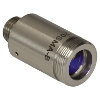 | こちらのファイバーコリメーターパッケージは、FC/PC、FC/APC、またはSMAコネクタ付きファイバからの出射光をコリメートするように、予めアライメントされています。各コリメーターパッケージは、405 nm~4.55 µmの波長で回折限界性能が得られるように工場で調整されています。設計波長以外でコリメータを使用することは可能ですが、色収差が生じるため最適な性能が得られるのは設計波長においてのみです。非球面レンズの実際の焦点距離は、色収差により波長に依存します。 |
| エアスペース型複レンズ、大径ビームコリメータ | 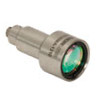 | 大径ビーム(Ø5.3 mm~Ø8.5 mm)用として、FC/PC、FC/APC、SMAコネクタ付きエアスペース型複レンズコリメータをご用意しています。こちらのコリメーターパッケージは、FCやSMAコネクタ付きファイバからの出射光をコリメートし、設計波長で回折限界性能が得られるように工場で予めアライメントされています。 |
| トリプレットレンズコリメータ | 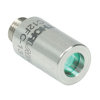 | 高品質なトリプレットコリメーターパッケージは、エアスペース型トリプレットレンズを使用しており、非球面レンズを用いたコリメータよりも優れたビーム品質が得られます。収差の小さいトリプレットを用いることの利点は、M2値として1(ガウシアン)に近い値が得られ、広がり角や波面エラーが小さくなることなどです。 |
| マルチモードファイバ用アクロマティックコリメータ | 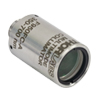 | 高NAアクロマティックコリメータは、メニスカスレンズとアクロマティック複レンズを組み合わせることで、可視~近赤外スペクトル域において球面収差の少ない優れた性能を発揮します。高NAのマルチモードファイバ用に設計されているため、オプトジェネティクスやファイバーフォトメトリの用途に適しています。 |
| 反射型コリメータ | 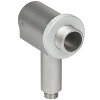 | 金属コーティング反射型コリメータは、90°軸外放物面(OAP)ミラーをベースにしています。レンズと違い、ミラーは広い波長範囲にわたり焦点距離が変化しません。この特性により、軸外放物面(OAP)ミラーを用いたコリメータは広い波長範囲に対応させるための調整が不要となるため、多色光を用いる用途に適しています。当社の反射型コリメータはシングルモードファイバからの光のコリメートには適していますが、シングルモードファイバへの結合には適していません。これらのコリメータにはUV強化型アルミニウムコーティングと保護膜付き銀コーティングの製品をご用意しており、それらにはFC/PC、FC/APCまたはSMAコネクタが取り付けられています。 |
| コンパクト反射型コリメータ |  | このコンパクトな反射型コリメータには、保護膜付き銀コーティングが施された90°軸外放物面(OAP)ミラーが組み込まれています。OAPミラーの焦点距離は波長に依存しないため、多色光用として適しています。 この固定式の反射型コリメータは、シングルモードファイバやマルチモードファイバからの出射光のコリメート用、およびマルチモードファイバへの光結合用として推奨しています。 これらのコリメータは当社の16 mmケージシステムに直接取り付けられます。 光入射用として、FC/PC、FC/APCまたはSMAコネクタの取り付けられた製品をご用意しています。 |
| 調整機能付き反射型コリメータ | 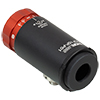 | 調整機能付き反射型コリメータは、保護膜付き銀コーティングが施された90°軸外放物面(OAP)ミラーをベースにしています。ファイバ-OAP間の距離が調整可能であり、またOAPミラーが波長によらず一定の焦点距離を有します。そのため、シングルモードまたはマルチモードファイバからの多色光をコリメートしたり、あるいは逆に多色光をそれらのファイバに結合したりすることができ、その際に最適化のための調整も可能です。これらの調整機能付きコリメータは15 mmの反射焦点距離を有し、FC/PC、FC/APC、またはSMAコネクタ付きの製品をご用意しています。 |
| FiberPort | 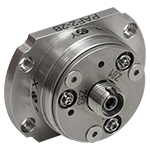 | こちらのコンパクトで極めて安定なFiberPortマイクロポジショナは、FC/PC、FC/APCまたはSMAコネクタ付き光ファイバとの光の入出射用として、安定で使いやすいプラットフォームです。シングルモード、マルチモードまたは偏波保持ファイバと組み合わせて使用することができ、ポスト、ステージ、プラットフォーム、レーザなどに取り付けることができます。組み込まれている非球面またはアクロマティックレンズのARコーティングは5種類から選択でき、また5軸のアライメント調整(3つの移動調整と2つの角度調整)が可能です。コンパクトでアライメントの長期安定性に優れたFiberPortは、ファイバへの光の結合、コリメート、組み込み用途(OEM用途)などに適しています。 |
| 調整可能型ファイバーコリメータ |  | このコリメータは、FC/PC、FC/APCまたはSMAコネクタに接続するよう設計されており、内部にはARコーティング付き非球面レンズが取付けられています。非球面レンズとファイバ先端との距離は、焦点距離の変化を補正したり、波長や対象までの距離に合わせて再コリメートしたりするために調整することができます。 |
| アクロマティックファイバーコリメータ、焦点調整可能 |  | 焦点調整の可能な当社のアクロマティックファイバーコリメータは、20 mm、40 mmまたは80 mmの有効焦点距離(EFL) を有し、その光学素子のARコーティングは3種類の広帯域ARコーティングから選ぶことができます。また、接続用コネクタの種類としては、FC/PC、FC/APCまたはSMA905をご用意しています。4枚のレンズを使用したエアスペース型設計であるため、非球面レンズのコリメータに比べてビーム品質に優れ(1に近いM2)、波面誤差は小さくなっています。これらのコリメータは自由空間光のファイバへの結合や、ファイバからの出射光のコリメートなどにご使用いただけます。また、距離をとって配置した2つのコリメータを用いて光を結合させると、光が2番目のコリメータに入る前にそのビームを操作することが可能になります。 |
| ズーム機能付きファイバーコリメータ | 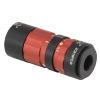 | こちらのコリメータは、ビームをコリメートしたまま、6~18 mmの範囲で焦点距離を変えることができます。そのため、コリメートした状態でビームサイズを変更できます。このデバイスは、用途に適した固定のファイバーコリメータを探す手間を省けるという利点に加え、1つで様々な幅広い用途に対応することができます。FC/PC、FC/APCまたはSMA905コネクタが付いており、反射防止コーティングは3種類からお選びいただけます。 |
| シングルモードファイバーピグテール付きコリメータ | 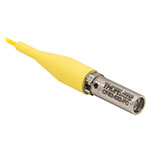 | シングルモードファイバーピグテール付きコリメータは、長さ1メートルのファイバとそれに対して予めアライメントされたARコーティング付き非球面レンズとで構成されており、532 nm、633 nm、780 nm、850 nm、1030 nm、1064 nm、1310 nm、1550 nmの8波長用の製品をご用意しています。コーティング波長域内のどの波長でもコリメートできますが、設計波長からずれると結合損失が増加します。 |
| 偏波保持ファイバーピグテール付きコリメータ | 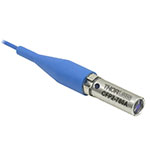 | 偏波保持ファイバーピグテール付きコリメータは、長さ1メートルのファイバとそれに対して予めアライメントされたARコーティング付き非球面レンズとで構成されており、633 nm、780 nm、980 nm、1064 nm、1550 nmの5波長用の製品をご用意しています。波長やコネクタについてはカスタム仕様も対応可能です。筐体の外側にはスロー軸と平行なラインが刻印されています。これは入射光の偏光面をアライメントする際の目安としてお使いいただけます。コーティング波長域内のどの波長でもコリメートできますが、設計波長からずれると結合損失が増加します。 |
| GRINレンズコリメータ | 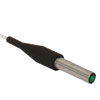 | GRINレンズファイバーコリメータは、630~1550 nmの範囲内の様々な波長に対してアライメントされた製品をご用意しており、FCまたはAPCコネクタ付きもしくはコネクタ無しのタイプからお選びいただけます。この有効径Ø1.8 mmのGRINレンズコリメータは、ファイバへの後方反射光を抑えるためにARコーティングが施されており、標準のシングルモードファイバまたはグレーデッドインデックス(GI)マルチモードファイバに結合されています。 |
| GRINレンズ | 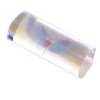 | この屈折率分布型(GRIN)レンズは630 nm、830 nm、1060 nm、1300 nm、または1560 nmの波長用にARコーティングが施されており、光ファイバから出射した光が自由空間の光学系を通過して再度別のファイバに入射するまでの各用途にご利用いただけます。また半導体レーザの出射光のファイバへの結合、ファイバからの出射光のディテクタへの集光、レーザ光のコリメートなどにも適しています。このGRINレンズは当社の ピグテール付きガラスフェルールやGRINレンズ/フェルール用スリーブと組み合わせてお使いいただくこともできます。 |
| Posted Comments: | |
Ann Fitzpatrick
(posted 2024-05-21 09:46:32.47) Is there and data on how temerature affect the collimation for F280FC-780?
Many thanks cdolbashian
(posted 2024-05-24 12:19:53.0) Thank you for reaching out to us. Depending on your temperature extremes you may or may not have significant thermal lensing. The glass used in this collimator is D-ZK3. I have contacted you directly to discuss your usage and some more properties of the glass used. Ruben Deckers
(posted 2024-04-12 13:36:17.397) I'm interested in the maximum angle at which light can be coupled back into the collimator and still be accepted by the fiber. For this I would need the refractive index of the material used in the lens or the radius of the curved part of the lens. Either would help me out massively!
Thanks in advance!
Kind regards jdelia
(posted 2024-04-18 12:09:59.0) Thank you for contacting Thorlabs. The lens used is our 354280-C aspheric lens, which is made out of a D-ZK3 substrate. I have reached out to you directly to provide the exact values you have requested. user
(posted 2024-02-21 11:16:59.803) Are the fc/pc collimators also compatible with fc/upc fibers? I have two of these collimators set up very similar to the example video, with both on kinematic mounts on posts and post holders that are identical, but I am unable to get more than a few nw of output from a several mw laser. cdolbashian
(posted 2024-03-15 04:06:37.0) Thank you for reaching out to us with this inquiry. For applications involving single mode fiber coupling, the cause of low coupling efficiency is typically due to alignment, rather than fiber type, as the differences between PC and UPC are not significant enough to cause this type of coupling error. I have contacted you directly to suggest some alignment methods. user
(posted 2024-01-11 08:23:24.083) I am looking to design the F260FC-1550 collimator into a system which will require the collimated output beam to be accurately aligned to a target. To achieve this the design will incorporate an alignment system. Ideally the adjustment range provided should be no greater than necessary in order to maximise adjustment resolution. I therefore need to know the maximum limit for the angle between the output beam and the collimator mechanical axis for this collimator type.
Many thanks in anticipation.
Ian. jpolaris
(posted 2024-01-11 03:36:13.0) Thank you for contacting Thorlabs. Unfortunately, pointing error is not something that we measure for this line of fixed focus collimators. However, we do specify a < 10 mrad pointing error for our FC/PC and FC/APC connectorized reflective collimators. I have reached out to you directly to discuss further. The following link will take you to the reflective collimators that I am referring to. https://www.thorlabs.com/newgrouppage9.cfm?objectgroup_id=4093&tabname=Specs ILIYA SHOFMAN
(posted 2023-11-21 02:23:58.08) Could you please include the typical values for return loss of these fixed-focus fiber collimator packages? Also, what coupling efficiency can one achieve with them? ksosnowski
(posted 2023-11-29 01:09:52.0) Thanks for reaching out to Thorlabs. We provide the typical transmission values for the AR coated lenses used in these fixed focus collimators however coupling efficiency when launching from freespace into fiber will also be dependent upon the input beam parameters and alignment, as well as the fiber type used to couple into. When we make these collimators we directly test the output beam parameters when aligning the lens with a fiber-coupled laser input before setting it in place with epoxy to ensure consistent performance and prevent drift. Currently we do not have specific sample data for coupling efficiency from freespace into fiber with these collimators. Kyesung Lee
(posted 2023-07-06 17:07:40.68) The fiber receptacles are narrow or wide key? cdolbashian
(posted 2023-07-13 01:49:41.0) Thank you for reaching out to us with this inquiry! These receptacles are 2.2mm wide key. Li Zong yue
(posted 2022-08-18 10:50:04.98) I want to know the damage threshold of this collimator for continuous wave ksosnowski
(posted 2022-08-23 01:19:59.0) Hello Li, thanks for reaching out to Thorlabs. We have not tested an exact CW limit for these, however the damage threshold for these fixed collimators is limited normally not by the lens surface rather by the epoxy used to fix the lens in place, or by the fiber connector epoxy. Typically we expect the limit at 1064nm to be in the neighborhood of 350mW before the connector epoxy will soften, and this varies some with wavelength. We recommend to avoid overfilling the lens or the fiber to reduce these risks of thermal damage, as these conditions can increase the amount of light converted to heat. Nathan Eschbach
(posted 2022-06-27 17:22:34.523) Can this collimator be used in the reverse direction to couple light to the fiber? My application involves collimating a beam, passing it through a medium, then reflecting back through and into the collimator to couple to the fiber. Is this feasible? Does AR coating effect this? cdolbashian
(posted 2022-07-06 09:02:41.0) Thank you for reaching out to us Nathan. Indeed a collimator can be used in the reverse direction for coupling. I have reached out to you directly to chat about your specific application. For future application-based questions, feel free to contact us at techsupport@thorlabs.com Kate Whittakaer
(posted 2021-10-25 09:58:36.483) Hi,
What kind of toelrance on pointing accuracy/centration can I expect from the F230FC-780?
Best Wishes,
Kate azandani
(posted 2021-10-27 04:43:37.0) Hello Kate, thank you for contacting Thorlabs. Unfortunately, we do not measure or specify this value for this product. If a specific pointing accuracy is needed, we can certainly arrange a custom item. I have reached out directly to discuss this further. kimsw0429
(posted 2018-06-06 21:26:22.217) F240FC-B
I don't know how to calculate the Diameter when The laser progresses 1m from focal length.
Can u explain? YLohia
(posted 2018-06-22 02:55:53.0) Hello, thank you for contacting Thorlabs. We have a tutorial here (https://www.thorlabs.com/newgrouppage9.cfm?objectgroup_id=944&tabname=Calculations) that shows how to calculate that. I have reached out to you directly in case you have further questions. melanie.macioce
(posted 2017-09-21 10:05:01.677) Hello,
I am looking for 2 fibered collimators and I wanted to know the damage threshold for 3 components :
- F240FC-980
- F230FC-780
- F240FC-780
Thank you in advance tfrisch
(posted 2017-11-01 10:46:11.0) Hello, thank you for contacting Thorlabs. The damage threshold will depend on many factors including whether the light is being collimated from fiber or coupled into fiber. Typically, the limiting factor will be the epoxy that holds the lens in the collimator when collimating, or the epoxy that holds the fiber in the connector when coupling. Avoid overfilling the lens or the fiber to reduce these risks of damage. 300mW is our general rule of thumb for power in a connectorized fiber, but we will reach out to you directly to discuss increasing that to the order of watts. radhakrishna.87
(posted 2017-04-13 00:13:50.067) Are fiber patch cables Thorlabs part number "P1-780PMAR-2" and Thorlabs model "P1-780A-FC-1" are appropriate to use with the Thorlabs Collimator "F220FC-780". Kindly suggest. jlow
(posted 2017-04-17 11:26:40.0) Response from Jeremy at Thorlabs: If you are using these with 780nm light, then the collimator is appropriate. ygv7535698
(posted 2017-03-01 13:25:04.24) Hello,did your company has a focus lens that Mates with FC/PC Connectors and Simplifies focuser of Output from Single Mode Fiber
thank you jlow
(posted 2017-03-01 01:52:59.0) Response from Jeremy at Thorlabs: You can use our Ø11mm fixed collimators with the AD1109F adapter and an M9 thread aspheric lens to focus the output from a single mode fiber.
AD1109F: https://www.thorlabs.com/newgrouppage9.cfm?objectgroup_id=219&pn=AD1109F
Aspheric lens: https://www.thorlabs.com/navigation.cfm?guide_id=2344 chiwen.cheng
(posted 2016-09-06 12:39:16.89) Could this collimator be used in collecting line scattering light into PMT detector? I want to use fiber to save space, but I have no experience with it. Thank you! tfrisch
(posted 2016-09-07 02:59:55.0) Hello, thank you for contacting Thorlabs. A collimator can be used in reverse to couple light into fiber, but keep in mind that the rays best coupled will be parallel to the axis of the lens (a collimated input). I will contact you directly about collecting scattered light. fc975
(posted 2015-07-07 11:52:13.543) Hello,
I would like to use a collimator in combination with a fiber optic spectrometer for fluorescence measurements to increase Signal-to-Noise-Ratio,
I am measuring the fluorescence emitted by a solid surface
is there a specific model you can recommend?
Thanks,
Filippo besembeson
(posted 2015-09-23 09:34:22.0) Response from Bweh at Thorlabs USA: I will followup with you to further discuss your application requirements. ludoangot
(posted 2015-06-03 14:34:02.843) These collimators are described for use in collimating light output from the fiber, could you please explain what limits their use to focus a collimated light into the fiber? jlow
(posted 2015-06-05 10:01:21.0) Response from Jeremy at Thorlabs: The collimator can be used to focus light into a fiber as well. You will need to match the focused spot size to the MFD of the fiber for optimal coupling. It is also recommended to use kinematic mounts with this to optimize the alignment. frank.kallmeyer
(posted 2014-12-12 15:04:59.9) What is the mechanical accuracy of the FC-PC connector? Is it in compliance with the EN 61754-13? What is the quality grade of the FC-PC connector? jlow
(posted 2014-12-19 09:09:46.0) Response from Jeremy at Thorlabs: The FC receptacle will accept FC/PC connectors defined in IEC61754-13. I will contact you directly to provide more details on the collimator. jlow
(posted 2014-08-19 09:12:37.577) Response from Jeremy at Thorlabs: Even with the focal length shift, you should still be able to get something on the output side. From your description, it seems like the alignment is off. I would suggest adjusting the X/Y position and angle of the collimator with respect to your beam. user
(posted 2014-08-17 08:25:12.297) I have a collimator (F280FC-B) connected to a MMF of 50um core diameter with FC/PC connector and NA of 0.2. I am trying to focus a collimated laser beam of 900nm with 1.5mm beam diameter. I measure the output power and get nothing. When not using the lens I can get some of the energy directly to the fiber. Is it because of the focal length shift in this wavelength? ihincks
(posted 2013-10-11 11:39:53.843) I have a collimator (F240FC-A) connected to both sides of a single mode polarization maintaining fibre (532nm). I am sending collimated light in one side and hoping for collimated light out the other side.
However, I am getting out an ugly beam; there are prominent rings surrounding the central peak of comparable size to the central peak. Is it possible that I am using it improperly, or is it defective? I can send you pictures of the beam if you'd like. jlow
(posted 2013-10-15 08:25:00.0) Response from Jeremy at Thorlabs: We will get in contact with you directly to discuss about this issue. tschalk
(posted 2013-01-09 11:33:00.0) This is a feedback from Thomas at Thorlabs. Thank you very much for your inquiry. The polarimeter head is equipped with a little socket screw on the side. It is a very tiny hole at the left side when you look to the front side of the polarimeter head. The collimator is shipped with a suitable Allan key. If you have placed the collimator into the polarimeter head than you can fix it by tightening the screw. user
(posted 2013-01-09 06:11:15.68) Dear Sir/Madam,
I am currently using the F230FC-A in combination with a Polarimeter, the PAX5710VIS. I was wondering whether you could recommend a way to secure the collimator in the polarimeter in a fixed position, so that the fiber can be removed from the collimator without adjusting the orientation. Although the collimator is threaded, there is currently no way to do this. Or am I overlooking the obvious? klee
(posted 2009-09-08 17:40:56.0) A response from Ken at Thorlabs to luc.rossey: Is the 40cm of space between the laser and fiber necessary? If not, you can use our FiberPorts coupler to couple the light into the fiber. FiberPorts can be attached to HeNe lasers directly using the HCL adapter. luc.rossey
(posted 2009-08-08 04:50:07.0) I want to conduct a didactical interference experiment in wich I need to couple a free space laserbeam from my NeHe lasersource to a single mode fiber and out to my detector. The fiber needs to be 80 m of lenght and at both end there has to be a fiber collimator aspheric lens package . I am but an amateur and I have no idee from which to chose. There will be about 40 cm of space between the lasersource and one end of the fiber. Could you help me please. |

| Item # | Alignment Wavelengtha | Lens AR Coating | Waist Diameterb | Waist Distancec | Full Angle Divergenced | Theoretical Divergence | NA | Focal Lengthe | Housing Outer Diameterf | External Threadingf |
|---|---|---|---|---|---|---|---|---|---|---|
| F671FC-405 | 405 nm | 395 - 415 nm Ravg < 0.25% | 0.63 mm | 3.56 mm | 0.05° +0.01 / -0.00° | Raw Data | 0.60 | 4.02 mm | 11 mm | M11 x 0.5 |

| Item # | Alignment Wavelengtha | Lens AR Coating | Waist Diameterb | Waist Distancec | Full-Angle Divergence | Theoretical Divergence | NA | Focal Lengthd | Housing Outer Diameter | External Threading |
|---|---|---|---|---|---|---|---|---|---|---|
| F110FC-532 | 532 nm | 350 - 700 nm Ravg < 0.5% | 1.14 mm | 5.85 mm | 0.03 +0.01 / -0.00°e | Raw Data | 0.38 | 6.09 mm | 11 mmg | M11 x 0.5g |
| F240FC-532 | 532 nm | 350 - 700 nm Ravg < 0.5% | 1.48 mm | 6.96 mm | 0.03 +0.01 / -0.00°f | Raw Data | 0.51 | 7.86 mm | 12 mmh | M12 x 0.5h |
| F220FC-532 | 532 nm | 350 - 700 nm Ravg < 0.5% | 2.1 mm | 10.72 mm | 0.02 +0.01 / -0.00°f | Raw Data | 0.25 | 10.90 mm | 11 mmg | M11 x 0.5g |

| Item # | Alignment Wavelengtha | Lens AR Coating | Waist Diameterb | Waist Distancec | Full-Angle Divergenced | Theoretical Divergence | NA | Focal Lengthe | Housing Outer Diameter | External Threading |
|---|---|---|---|---|---|---|---|---|---|---|
| F230FC-A | 543 nm | 350 - 700 nm Ravg < 0.5% | 0.8 mm | 4.02 mm | 0.049° | Raw Data | 0.57 | 4.34 mm | 11 mmf | M11 x 0.5f |
| F240FC-A | 543 nm | 350 - 700 nm Ravg < 0.5% | 1.5 mm | 6.97 mm | 0.027° | Raw Data | 0.51 | 7.86 mm | 12 mmg | M12 x 0.5g |
| F220FC-A | 543 nm | 350 - 700 nm Ravg < 0.5% | 2.0 mm | 10.74 mm | 0.020° | Raw Data | 0.25 | 10.92 mm | 11 mmf | M11 x 0.5f |
| F260FC-A | 543 nm | 350 - 700 nm Ravg < 0.5% | 2.8 mm | 14.85 mm | 0.01 +0.01 / -0.00° | Raw Data | 0.17 | 15.01 mm | 11 mmf | M11 x 0.5f |
| F280FC-A | 543 nm | 350 - 700 nm Ravg < 0.5% | 3.3 mm | 17.40 mm | 0.012 +0.01 / -0.00° | Raw Data | 0.15 | 18.07 mm | 11 mmf | M11 x 0.5f |

| Item # | Alignment Wavelengtha | Lens AR Coating | Waist Diameterb | Waist Distancec | Full-Angle Divergenced | Theoretical Divergence | NA | Focal Lengthe | Housing Outer Diameter | External Threading |
|---|---|---|---|---|---|---|---|---|---|---|
| F230FC-B | 633 nm | 650 - 1050 nm Ravg < 0.5%f | 0.8 mm | 4.07 mm | 0.056° | Raw Data | 0.56 | 4.43 mm | 11 mmg | M11 x 0.5g |
| F110FC-633 | 633 nm | 350 - 700 nm Ravg < 0.5% | 1.16 mm | 5.93 mm | 0.04 +0.01 / -0.00° | Raw Data | 0.38 | 6.17 mm | 11 mmg | M11 x 0.5g |
| F240FC-B | 633 nm | 650 - 1050 nm Ravg < 0.5%f | 1.5 mm | 6.96 mm | 0.031° | Raw Data | 0.50 | 7.93 mm | 12 mmh | M12 x 0.5h |
| F220FC-B | 633 nm | 650 - 1050 nm Ravg < 0.5%f | 2.1 mm | 10.83 mm | 0.022° | Raw Data | 0.25 | 10.99 mm | 11 mmg | M11 x 0.5g |
| F260FC-B | 633 nm | 650 - 1050 nm Ravg < 0.5%f | 2.8 mm | 14.87 mm | 0.016 +0.01 / -0.00° | Raw Data | 0.16 | 15.15 mm | 11 mmg | M11 x 0.5g |
| F280FC-B | 633 nm | 650 - 1050 nm Ravg < 0.5%f | 3.4 mm | 17.52 mm | 0.014 +0.01 / -0.00° | Raw Data | 0.15 | 18.24 mm | 11 mmg | M11 x 0.5g |

| Item # | Alignment Wavelengtha | Lens AR Coating | Waist Diameterb | Waist Distancec | Full-Angle Divergence | Theoretical Divergence | NA | Focal Lengthd | Housing Outer Diameter | External Threading |
|---|---|---|---|---|---|---|---|---|---|---|
| F230FC-780 | 780 nm | 650 - 1050 nm Ravg < 0.5% | 0.98 mm | 4.12 mm | 0.06 +0.01 / -0.00°e | Raw Data | 0.55 | 4.51 mm | 11 mmg | M11 x 0.5g |
| F110FC-780 | 780 nm | 650 - 1050 nm Ravg < 0.5% | 1.36 mm | 6.00 mm | 0.04 +0.01 / -0.00°f | Raw Data | 0.37 | 6.24 mm | 11 mmg | M11 x 0.5g |
| F240FC-780 | 780 nm | 650 - 1050 nm Ravg < 0.5% | 1.5 mm | 7.09 mm | 0.036°f | Raw Data | 0.50 | 8.00 mm | 12 mmh | M12 x 0.5h |
| F220FC-780 | 780 nm | 650 - 1050 nm Ravg < 0.5% | 2.1 mm | 10.91 mm | 0.026°f | Raw Data | 0.26 | 11.07 mm | 11 mmg | M11 x 0.5g |
| F260FC-780 | 780 nm | 650 - 1050 nm Ravg < 0.5% | 3.33 mm | 15.11 mm | 0.02 +0.01 / -0.00°e | Raw Data | 0.16 | 15.29 mm | 11 mmg | M11 x 0.5g |
| F280FC-780 | 780 nm | 650 - 1050 nm Ravg < 0.5% | 4.00 mm | 17.68 mm | 0.01 +0.01 / -0.00°e | Raw Data | 0.15 | 18.40 mm | 11 mmg | M11 x 0.5g |

| Item # | Alignment Wavelengtha | Lens AR Coating | Waist Diameterb | Waist Distancec | Full-Angle Divergence | Theoretical Divergence | NA | Focal Lengthd | Housing Outer Diameter | External Threading |
|---|---|---|---|---|---|---|---|---|---|---|
| F230FC-850 | 850 nm | 650 - 1050 nm Ravg < 0.5% | 0.98 mm | 4.13 mm | 0.06 +0.01 / -0.00°e | Raw Data | 0.49 | 4.53 mm | 11 mmg | M11 x 0.5g |
| F110FC-850 | 850 nm | 650 - 1050 nm Ravg < 0.5% | 1.36 mm | 6.02 mm | 0.05 +0.01 / -0.00°f | Raw Data | 0.37 | 6.26 mm | 11 mmg | M11 x 0.5g |
| F240FC-850 | 850 nm | 650 - 1050 nm Ravg < 0.5% | 1.74 mm | 7.11 mm | 0.04 +0.01 / -0.00°e | Raw Data | 0.50 | 8.02 mm | 12 mmh | M12 x 0.5h |
| F220FC-850 | 850 nm | 650 - 1050 nm Ravg < 0.5% | 2.41 mm | 10.94 mm | 0.03 +0.01 / -0.00°e | Raw Data | 0.25 | 11.12 mm | 11 mmg | M11 x 0.5g |
| F260FC-850 | 850 nm | 650 - 1050 nm Ravg < 0.5% | 3.32 mm | 15.15 mm | 0.02 +0.01 / -0.00°e | Raw Data | 0.16 | 15.33 mm | 11 mmg | M11 x 0.5g |
| F280FC-850 | 850 nm | 650 - 1050 nm Ravg < 0.5% | 3.99 mm | 17.73 mm | 0.02 +0.01 / -0.00°e | Raw Data | 0.15 | 18.45 mm | 11 mmg | M11 x 0.5g |

| Item # | Alignment Wavelengtha | Lens AR Coating | Waist Diameterb | Waist Distancec | Full-Angle Divergence | Theoretical Divergence | NA | Focal Lengthd | Housing Outer Diameter | External Threading |
|---|---|---|---|---|---|---|---|---|---|---|
| F230FC-980 | 980 nm | 650 - 1050 nm Ravg < 0.5% | 1.0 mm | 4.2 mm | 0.073 +0.010 / -0.000e | Raw Data | 0.49 | 4.55 mm | 11 mmg | M11 x 0.5g |
| F110FC-980 | 980 nm | 650 - 1050 nm Ravg < 0.5% | 1.35 mm | 6.05 mm | 0.05 +0.01 / -0.00°e | Raw Data | 0.37 | 6.29 mm | 11 mmg | M11 x 0.5g |
| F240FC-980 | 980 nm | 650 - 1050 nm Ravg < 0.5% | 1.7 mm | 7.15 mm | 0.04 +0.01 / -0.00°f | Raw Data | 0.50 | 8.06 mm | 12 mmh | M12 x 0.5h |
| F220FC-980 | 980 nm | 650 - 1050 nm Ravg < 0.5% | 2.4 mm | 10.99 mm | 0.03 +0.01 / -0.00°f | Raw Data | 0.25 | 11.16 mm | 11 mmg | M11 x 0.5g |
| F280FC-980 | 980 nm | 650 - 1050 nm Ravg < 0.5% | 4.0 mm | 17.81 mm | 0.02 +0.01 / -0.00°f | Raw Data | 0.15 | 18.53 mm | 11 mmg | M11 x 0.5g |

| Item # | Alignment Wavelengtha | Lens AR Coating | Waist Diameterb | Waist Distancec | Full-Angle Divergenced | Theoretical Divergence | NA | Focal Lengthe | Housing Outer Diameter | External Threading |
|---|---|---|---|---|---|---|---|---|---|---|
| F230FC-1064 | 1064 nm | 650 - 1050 nm Ravg < 0.5% | 1.0 mm | 4.2 mm | 0.08 +0.01 / -0.00° | Raw Data | 0.55 | 4.56 mm | 11 mmf | M11 x 0.5f |
| F110FC-1064 | 1064 nm | 1050 - 1700 nm Ravg < 0.5% | 1.38 mm | 6.07 mm | 0.06 +0.01 / -0.00° | Raw Data | 0.37 | 6.31 mm | 11 mmf | M11 x 0.5f |
| F240FC-1064 | 1064 nm | 650 - 1050 nm Ravg < 0.5% | 1.8 mm | 7.2 mm | 0.04 +0.01 / -0.00° | Raw Data | 0.50 | 8.07 mm | 12 mmg | M12 x 0.5g |
| F220FC-1064 | 1064 nm | 1050 - 1075 nm R < 0.25% | 2.4 mm | 11.02 mm | 0.032° | Raw Data | 0.25 | 11.17 mm | 11 mmf | M11 x 0.5f |
| F260FC-1064 | 1064 nm | 650 - 1050 nm Ravg < 0.5% | 3.4 mm | 15.3 mm | 0.02 +0.01 / -0.00° | Raw Data | 0.16 | 15.43 mm | 11 mmf | M11 x 0.5f |

| Item # | Alignment Wavelengtha | Lens AR Coating | Waist Diameterb | Waist Distancec | Full-Angle Divergenced | Theoretical Divergence | NA | Focal Lengthe | Housing Outer Diameter | External Threading |
|---|---|---|---|---|---|---|---|---|---|---|
| F230FC-C | 1310 nm | 1050 - 1620 nm Ravg < 0.5% | 0.8 mm | 4.20 mm | 0.114° | Raw Data | 0.53 | 4.64 mm | 11 mmf | M11 x 0.5f |
| F110FC-1310 | 1310 nm | 1050 - 1700 nm Ravg < 0.5% | 1.15 mm | 6.10 mm | 0.08 +0.01 / -0.00° | Raw Data | 0.37 | 6.35 mm | 11 mmf | M11 x 0.5f |
| F240FC-C | 1310 nm | 1050 - 1620 nm Ravg < 0.5% | 1.5 mm | 7.21 mm | 0.065° | Raw Data | 0.49 | 8.13 mm | 12 mmg | M12 x 0.5g |
| F220FC-C | 1310 nm | 1050 - 1620 nm Ravg < 0.5% | 2.0 mm | 11.08 mm | 0.047° | Raw Data | 0.24 | 11.23 mm | 11 mmf | M11 x 0.5f |
| F260FC-C | 1310 nm | 1050 - 1620 nm Ravg < 0.5% | 2.8 mm | 15.35 mm | 0.034° | Raw Data | 0.16 | 15.52 mm | 11 mmf | M11 x 0.5f |
| F280FC-C | 1310 nm | 1050 - 1620 nm Ravg < 0.5% | 3.4 mm | 17.96 mm | 0.028° | Raw Data | 0.15 | 18.67 mm | 11 mmf | M11 x 0.5f |

| Item # | Alignment Wavelengtha | Lens AR Coating | Waist Diameterb | Waist Distancec | Full-Angle Divergenced | Theoretical Divergence | NA | Focal Lengthe | Housing Outer Diameter | External Threading |
|---|---|---|---|---|---|---|---|---|---|---|
| F230FC-1550 | 1550 nm | 1050 - 1620 nm Ravg < 0.5% | 0.9 mm | 4.21 mm | 0.128° | Raw Data | 0.53 | 4.67 mm | 11 mmf | M11 x 0.5f |
| F110FC-1550 | 1550 nm | 1050 - 1700 nm Ravg < 0.5% | 1.21 mm | 6.13 mm | 0.09 +0.01 / -0.00° | Raw Data | 0.37 | 6.37 mm | 11 mmf | M11 x 0.5f |
| F240FC-1550 | 1550 nm | 1050 - 1620 nm Ravg < 0.5% | 1.6 mm | 7.26 mm | 0.073° | Raw Data | 0.49 | 8.18 mm | 12 mmg | M12 x 0.5g |
| F220FC-1550 | 1550 nm | 1050 - 1620 nm Ravg < 0.5% | 2.1 mm | 11.15 mm | 0.053° | Raw Data | 0.24 | 11.29 mm | 11 mmf | M11 x 0.5f |
| F260FC-1550 | 1550 nm | 1050 - 1620 nmRavg < 0.5% | 3.0 mm | 15.44 mm | 0.038° | Raw Data | 0.16 | 15.58 mm | 11 mmf | M11 x 0.5f |
| F280FC-1550 | 1550 nm | 1050 - 1620 nm Ravg < 0.5% | 3.6 mm | 18.07 mm | 0.032° | Raw Data | 0.15 | 18.75 mm | 11 mmf | M11 x 0.5f |

| Item # | Alignment Wavelengtha | Lens AR Coating | Waist Diameterb | Waist Distancec | Full-Angle Divergenced | Theoretical Divergence | NA | Focal Lengthe | Housing Outer Diameterf | External Threadingf |
|---|---|---|---|---|---|---|---|---|---|---|
| F028FC-2000 | 2 µm | 1.8 - 3.0 µm Ravg < 1.0% | 1.2 mm | 5.73 mm | 0.13° +0.01 / -0.00° | Raw Data | 0.56 | 5.91 mm | 11 mm | M11 x 0.5 |

コリメータは、工場において設計波長に対してアライメントされていますが、設計波長以外の広い波長範囲において、その広がり角はそれほど大きくなりません。 したがって、用途によっては、ARコーティング範囲内であれば、設計波長以外の波長でも使用することができる場合があります。 コリメータの広がり角グラフ(理論値)をご覧いただき、用途に合っているかどうかをご確認ください。
| Item #a | Alignment Wavelength | Lens AR Coating | Waist Diameterb | Waist Distancec | Full-Angle Divergenced | Theoretical Divergence | NA | Focal Lengthe | Housing Outer Diameterf | External Threadingf |
|---|---|---|---|---|---|---|---|---|---|---|
| F028FC-3450 | 3.45 µm | 3 - 5 µm Ravg < 1.0% | 2.01 mm | 5.77 mm | 0.125 +0.01 / -0.00° | Raw Data | 0.56 | 5.94 mm | 11 mm | M11 x 0.5 |

コリメータは、工場において設計波長に対してアライメントされていますが、設計波長以外の広い波長範囲において、その広がり角はそれほど大きくなりません。 したがって、用途によっては、ARコーティング範囲内であれば、設計波長以外の波長でも使用することができる場合があります。 コリメータの広がり角グラフ(理論値)をご覧いただき、用途に合っているかどうかをご確認ください。
| Item # | Alignment Wavelengtha | Lens AR Coating | Waist Diameterb | Waist Distancec | Full-Angle Divergenced | Theoretical Divergence | NA | Focal Lengthe | Housing Outer Diameterf | External Threadingf |
|---|---|---|---|---|---|---|---|---|---|---|
| F028FC-4950 | 4.55 µm | 3 - 5 µm Ravg < 1.0% | 2.16 mm | 5.79 mm | 0.15 +0.05 / -0° | Raw Data | 0.56 | 5.97 mm | 11 mm | M11 x 0.5 |
 Products Home
Products Home















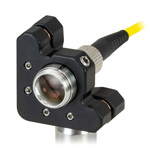

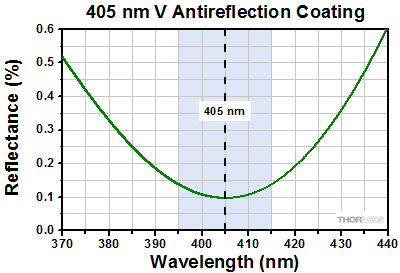
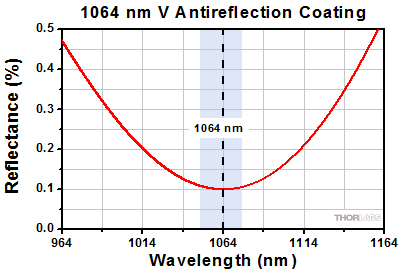

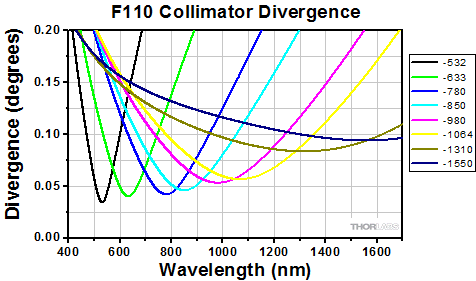
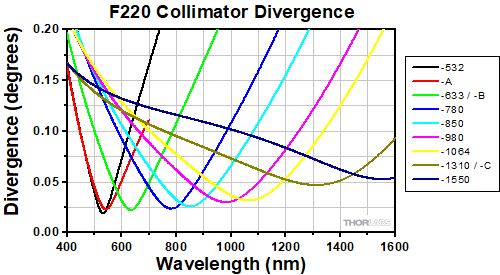
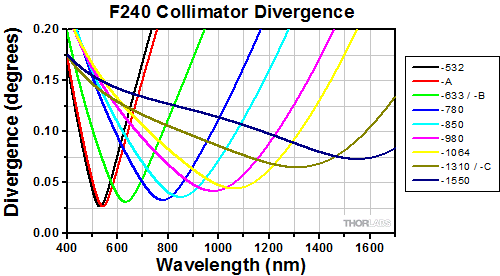
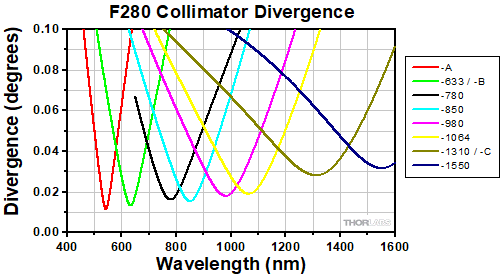
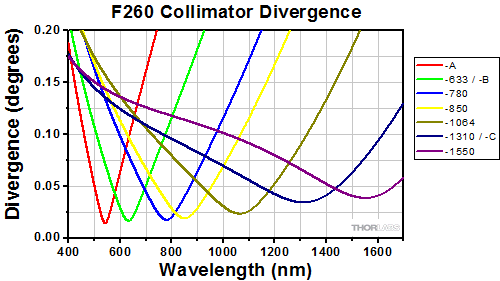
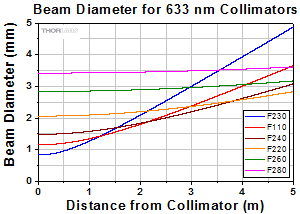

 FC/PC焦点固定コリメーターパッケージ
FC/PC焦点固定コリメーターパッケージ